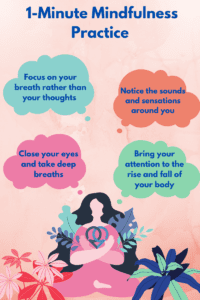We have all thought it before, “If only I would have been a little more mindful…” We think about this when we lose our car keys or drop our wallets. We mull this over when we thoughtlessly say something and end up hurting someone’s feelings. We worry over this when we find ourselves up against an important deadline or when a work proposal falls through. Or when we don’t understand why we feel angry or sad for no apparent reason. If only we were mindful, right? Well, here’s the cool thing about that—we can practice mindfulness. But first, what is mindfulness?
According to the Google definition, mindfulness is “the quality or state of being conscious or aware of something.” Or, “a mental state achieved by focusing one’s awareness on the present moment, while calmly acknowledging and accepting one’s feelings, thoughts, and bodily sensations, used as a therapeutic technique.” It’s that second definition that is important. In this definition, we build a closer relationship with mindfulness, and in reality, ourselves.
What are the Benefits of Mindfulness Practice?
Mindfulness has some incredible benefits that can help you better understand and cope with your emotional responses and the world around you. Some of these benefits include:
-
- Better emotional regulation: When we are more aware of ourselves, we can begin to regulate our emotional state better. That means when faced with situations that might cause us distress, we can meet them with a clearer mind.
- Reduction of obsessive thoughts: It can be easy to get into a tangle of thoughts over a situation. Research shows that those who participate in regular mindfulness practices have less intrusive thought patterns or depressive episodes.
- Better memory and focus: Mindfulness brings awareness to more than just our inner thoughts and feelings. It also brings awareness to our surroundings. It helps us increase memory retention and gives us the ability to keep a consistent focus on a task.
- Less stress: When we are mindful of our thoughts and actions, our stress levels begin to drop. With consistent mindfulness practice or cognitive-based therapies, individuals find themselves more aware of their stressors and can ease the mind quicker than those who don’t use these practices.
- Better partnerships: Mindfulness helps us build a less reactive and more thoughtful mindset. In turn, this helps us in our personal relationships to manage conflict better and have a better insight into our partner’s wellbeing.
It’s incredible what mindfulness can do for us,
but what is a mindfulness practice, really?
Mindfulness Exercises
There are many ways to practice mindfulness, but meditation is the most common one. Many people have issues with getting into what they feel is the “right state of mind” to enjoy meditation fully. But just as we must continue with our exercise routine to see results, we also must think of mindfulness practice in the same way. Not sure how to get started? Let’s take a minute to practice.
1-Minute Mindfulness Practice
- Find yourself a comfortable seat.
- Close your eyes and take a deep breath in through the nose and out through the nose.
- Focus your thoughts on your breath—acknowledge the thoughts that come up but return your awareness to the breath.
- Bring your awareness to the sounds and sensations of the room around you. What do you hear? What do you smell? What does the room feel like? What does your body feel like in your seat?
- Then bring your focus back to the breath as you feel your chest rise and fall. Now open your eyes.
You have just completed a mindfulness exercise!
Another great way to bring awareness into your life is through cognitive behavioral therapy (CBT). A CBT-trained therapist can help you understand your thought patterns and support you as you become cognitively aware of yourself, your reactions and your relationships. Many people blend these two practices as they begin to learn more about themselves and their emotions.
The Practice of a Mindful Promise
Mindfulness practices can help you improve your awareness, memory, emotions and relationships. When we look at it this way, it can also help us reinforce the promises we make to ourselves and others. Mindfulness is the action of intention — when we move through the world with focus, we begin to be more thoughtful of how our actions and reactions impact us and others.
So, make a promise to yourself today. Make the promise to stay mindful, whether through mindful meditation or scheduled therapy with an expert. And work to keep that promise to yourself so that you may, in turn, keep thoughtful promises to others.
And while the benefits of mindfulness speak for themselves, it is always important to remember that there is always support with any practice, physical or mental. We can do great things alone but even greater things together.


